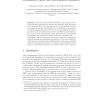Free Online Productivity Tools
i2Speak
i2Symbol
i2OCR
iTex2Img
iWeb2Print
iWeb2Shot
i2Type
iPdf2Split
iPdf2Merge
i2Bopomofo
i2Arabic
i2Style
i2Image
i2PDF
iLatex2Rtf
Sci2ools
116
click to vote
RR
2007
Springer
2007
Springer
Decidability Under the Well-Founded Semantics
The well-founded semantics (WFS) for logic programs is one of the few major paradigms for closed-world reasoning. With the advent of the Semantic Web, it is being used as part of rule systems for ontology reasoning, and also investigated as to its usefulness as a semantics for hybrid systems featuring combined open- and closed-world reasoning. Even in its most basic form, however, the WFS is undecidable. In fact, it is not even semi-decidable, which means that it is a theoretical impossibility that sound and complete reasoners for the WFS exist. Surprisingly, however, this matter has received next to no attention in research, although it has already been shown in 1995 by John Schlipf [1]. In this paper, we present several conditions under which query-answering under the well-founded semantics is decidable or semi-decidable. To the best of our knowledge, these are the very first results on such conditions.
Related Content
| Added | 09 Jun 2010 |
| Updated | 09 Jun 2010 |
| Type | Conference |
| Year | 2007 |
| Where | RR |
| Authors | Natalia Cherchago, Pascal Hitzler, Steffen Hölldobler |
Comments (0)

